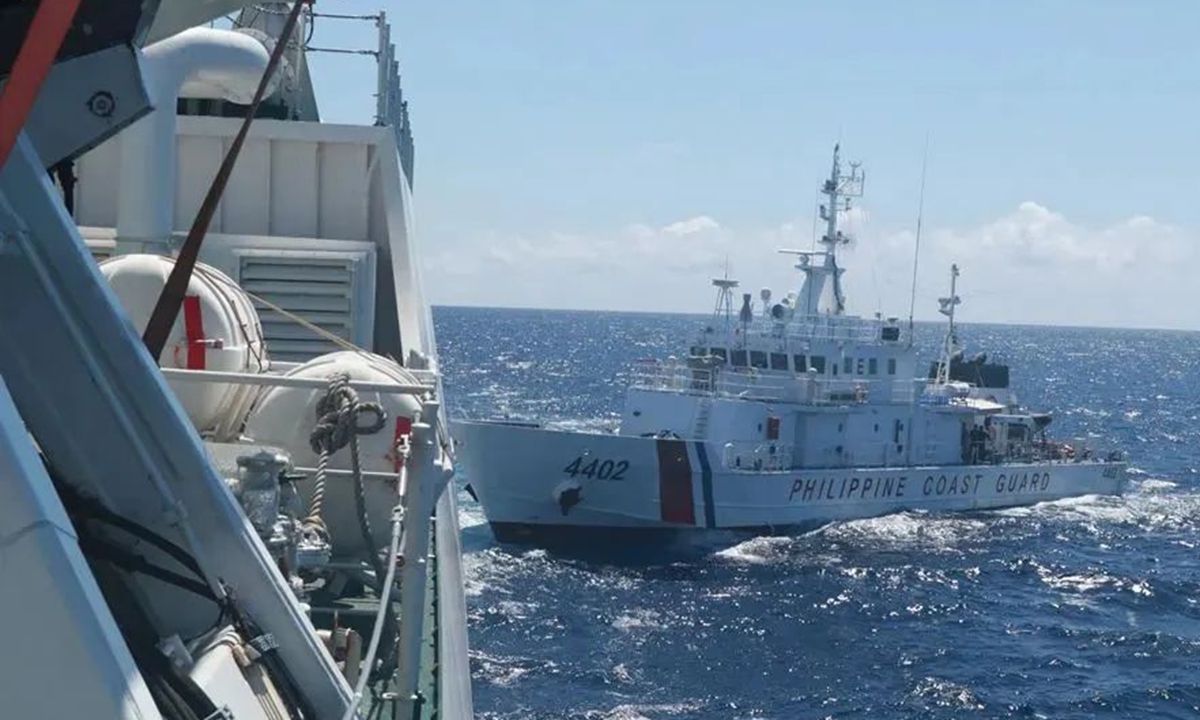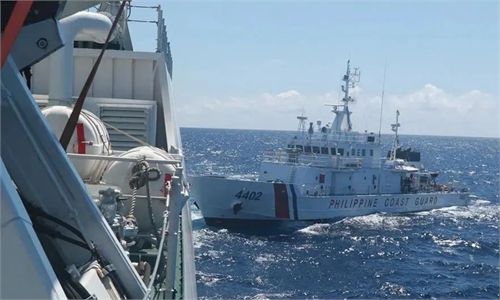China warns against Filipino Ren'ai Reef provocation with water cannons; US offers support with empty promises

China Coast Guard drives away Philippine vessels intruding into waters of China's Nansha Islands
On Saturday, a Chinese coast guard ship used water cannons to drive away two Philippine supply ships near Ren'ai Reef. Manila strongly condemned the action on Sunday, and Washington quickly came out, declaring that it stands with the Philippines, and stating that "an armed attack on Philippine public vessels, aircraft, and armed forces — including those of its Coast Guard in the South China Sea — would invoke U.S. mutual defense commitments under Article IV of the 1951 U.S. Philippines Mutual Defense Treaty." In my view, the protest from the Philippines and the support from the US both don't worth a whoop. China's control advantage near Ren'ai Reef is unshakable.Ren'ai Reef is one of the main focal points of the South China Sea dispute. The reason is that on May 9, 1999, two days after the US military bombed the Chinese embassy in Yugoslavia, the Philippine military intentionally ran an old warship aground on Ren'ai Reef, which was a blatant act of robbery during a crisis. Under China's solemn representations, the Philippines repeatedly stated that they would tow the ship away, but they never followed through and attempted to turn the "grounding" of the Philippine warship on Ren'ai Reef into a permanent "fait accompli."
China has shown great patience in resolving the issue of Ren'ai Reef. That grounded warship is a US warship from World War II and has already become dilapidated. Before the Philippines tows the ship away, China, out of humanitarian consideration, allows the Philippines to provide food and drinking water to the Filipino soldiers on board, but strongly opposes the Philippines sending reinforcement materials to the ship— if you refuse to tow away the stranded warship, then just wait for it to decompose on its own. Don't even think about turning it into a permanent outpost for the Philippines on Ren'ai Reef.
The actual situation is that when China-Philippines relations are relatively good, the supply issue of Ren'ai Reef can be better coordinated. However, once Manila adopts a tough stance toward China and attempts to reinforce the grounded warship, China will firmly prevent it, and the Philippine military's supply to the grounded warship will be met with resistance. Over the years, the game between China and the Philippines regarding Ren'ai Reef has been fluctuating but never interrupted.
After Ferdinand Marcos Jr came to power, friction over Ren'ai Reef escalated again. In June, two Philippine Coast Guard vessels intruded into the waters off the Ren'ai Reef, and two Chinese Coast Guard ships drove them away. The tonnage of Chinese Coast Guard ships is larger than that of the Philippines, giving the former an advantage in expulsion. In addition, another incident occurred in April when a group of journalists, invited by the Philippine authorities, tried to board the grounded warship near Ren'ai Reef for an interview but were intercepted by a Chinese Coast Guard ship. Those journalists took photos, while the Chinese Coast Guard ships were less than 45 meters away from them.
The Philippine side likes to hype up the friction near Ren'ai Reef, as they have political needs in this regard and a large number of media outlets are seeking attention. However, the Philippine side is fundamentally incapable of reversing the situation where China effectively controls the waters near Ren'ai Reef. After years of construction in the South China Sea region, it is evident that China maintains a presence in the Ren'ai Reef area. The US asserts that its alliance with the Philippines has an influence on the South China Sea issue; however, both nations are hesitant to engage in confrontational actions as they are aware of their limited chances of success.
If the Philippines takes new major actions in the Ren'ai Reef issue and creates a crisis, I believe it is not impossible for China to decisively remove the stranded warship and drag it away from its current position, letting it sink into the sea on its own. If the Philippines continues to escalate provocations, this is likely to be the ultimate result.
In this "cat and mouse" game, the US wants to tilt the balance, but the risks it faces are extremely high. It knows that China is not afraid and will not back down, so it dares not act recklessly. The logic of the Ren'ai Reef issue will be as follows: The more aggressive the Philippines becomes, the more high-profile support it receives from the US, the stronger China's countermeasures will be. It is one thing for the Philippines to create some noise for self-consumption, but if it wants to rely on the US to force China to retreat from its control over the Ren'ai Reef, it has miscalculated.
The author is a Chinese media professional. opinion@globaltimes.com.cn


